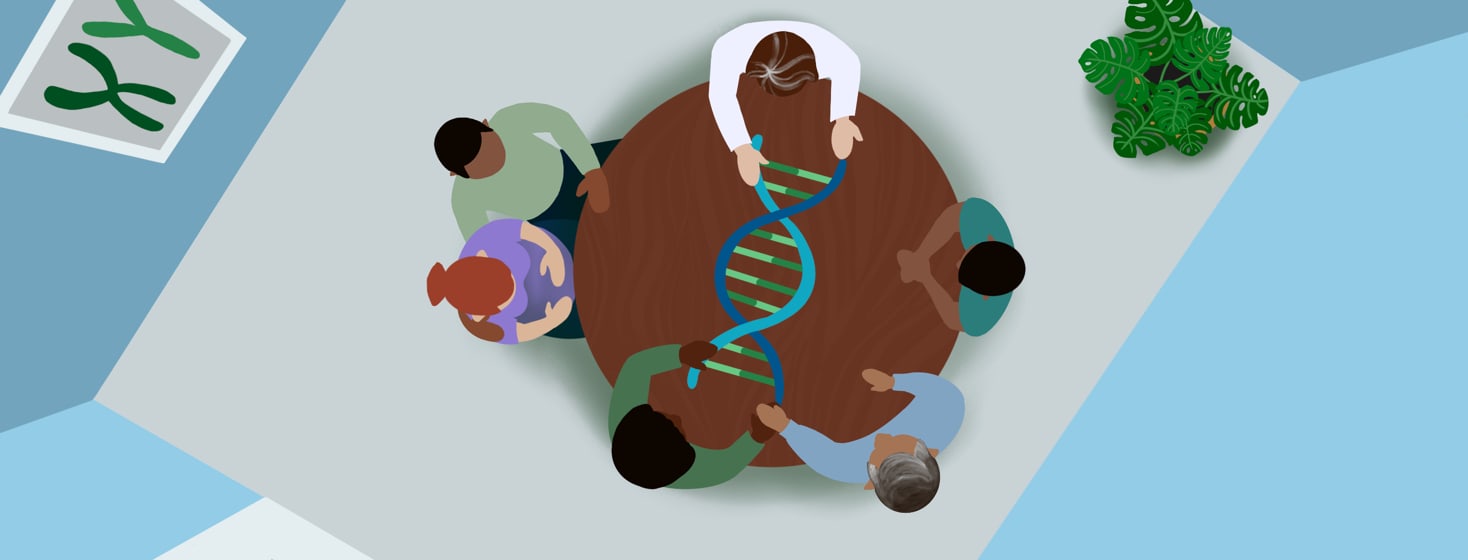What to Expect From Genetic Counseling and Testing
Reviewed by: HU Medical Review Board | Last reviewed: October 2022 | Last updated: January 2026
If you have a rare disease or one runs in your family, your doctor might suggest genetic counseling and testing. People get genetic testing for a variety of reasons. You do not have to be pregnant or thinking about starting a family to see a genetic counselor.
What is genetic counseling?
Genetic counseling may explain how genetic disorders might affect you and your family. The counseling process helps you identify your risk of a genetic disorder. Counseling also looks at your family health history and interprets that information. This counseling can help you decide whether you want to undergo genetic testing.1,2
What does a genetic counselor do?
A genetic counselor sees people in an office or hospital. They can work with obstetricians, neurologists, cardiologists, and other medical specialists. Genetic counselors can provide general or specialized services in different areas, including:2
- Pregnancy planning and prenatal – People thinking about starting a family or those who are already pregnant
- Childhood diseases – Children and their families
- Cancer – People with cancer and their family members
- Cardiovascular – People with heart conditions and their family members
- Neurology – People with brain and nervous system conditions and their family members
Genetic counselors help order appropriate tests and interpret complex test results. They can provide you with information about your potential genetic diseases. They can help you understand how likely it is you or a family member will develop a genetic condition. This information can help you decide if genetic testing is right for you. If you do get testing, the counselor can explain the results and help you understand what they mean for your health.1
Genetic counselors may also help people get genetic testing covered by their health insurance.2
A genetics counselor will not:3
- Tell you what kind of decision to make
- Recommend whether you should have children
- Recommend that you continue or end a pregnancy
- Tell you to undergo testing for a genetic disorder
How can genetic counselors help people with rare diseases?
Genetic counselors can help people with rare diseases in a variety of ways.
If you or your partner lives with a rare condition and are thinking about starting a family, a genetic counselor can help explain how your condition is passed down. If your baby is born with a birth defect or your child is showing signs of having a disorder, a genetics counselor may be able to address your concerns.1,3
If you or your partner have a known family history of a genetic condition, the genetics counselor can talk about what testing may mean. When the results come back, the counselor will review them with you and explain them.1,4
If you have a rare disease or carry the genetic information that means you could pass it down to your child, genetic counselors can help you in other ways. With some conditions, doctors know that certain genetic changes (mutations) are linked to different symptoms and severity of disease. A genetic counselor can review your genetic mutation with you and what it might mean. They can also speak with your doctor to help you get the right care for your specific needs.1,4
How can genetic counselors help people with a family history of a certain disease?
If you know a certain disease runs through your family, a genetic counselor can create a family history. They will talk with you about how likely it is that you or a family member has a genetic condition. They can then discuss whether genetic testing is an option and what that includes.1,4
Examples of diseases you may know run in your family include:1
- Transthyretin amyloid polyneuropathy (ATTR-PN)
- Sickle cell disease
- Huntington's disease
- Hemophilia
- Muscular dystrophy
- Hereditary breast and ovarian cancer
How do I find a genetic counselor?
There are many ways to find a genetic counselor. The National Society of Genetic Counselors has a directory you can search. If you are looking for a genetics clinic, you can use the directory of genetics clinics published by the American College of Medical Genetics and Genomics. If you are pregnant or thinking of becoming pregnant, ask your ob-gyn if there is a genetic counselor they recommend.
